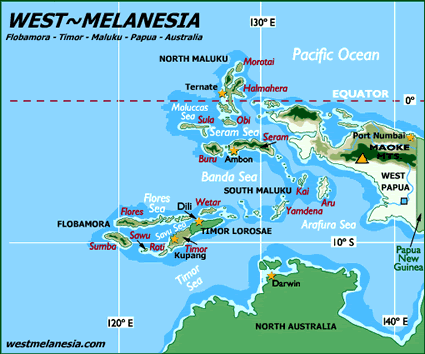The East Tarangan people live primarily on the southeastern portion of Maluku Province, in the south Aru Islands, along the east coast of Tarangan Island, and in villages near the Maikor Strait. Their language, East Tarangan, belongs to the Austronesian family and is considered endangered, as it is not taught in schools and is increasingly vulnerable to decline among younger generations.
Historically, the East Tarangan have maintained a distinct identity within the Maluku-Southern people cluster, shaped by centuries of maritime trade and cultural exchange in the Aru Islands. Their isolation has preserved traditional customs, though modern influences are gradually reaching their communities.
The East Tarangan people live in small coastal villages where fishing and small-scale farming form the backbone of daily life. Families often cultivate crops such as cassava, sago, and coconuts, while fishing provides a vital source of protein and income. Houses are typically built from local materials like wood and palm leaves, reflecting a simple yet functional architectural style suited to the tropical climate. Family life is strongly collectivist, with respect for elders and close ties among extended relatives. Decisions often involve consultation within the family, and age determines status in the household hierarchy.
Celebrations include Christian holidays such as Christmas and Easter, which are marked by communal meals, worship services, and traditional music. Food is locally sourced, with meals centered on fish, root crops, and tropical fruits. Social gatherings reinforce community bonds and provide opportunities for storytelling and cultural expression.
The East Tarangan people primarily identify with Christianity, particularly Protestant traditions. Church attendance and participation in Christian festivals are common, but spiritual engagement varies, and many communities lack access to discipleship resources. While Christianity is the dominant faith, traditional beliefs and practices may still influence aspects of daily life, especially in rural areas. There is no complete Bible translation in the East Tarangan language, and resources such as the JESUS Film or audio recordings are not available, which limits opportunities for a deeper understanding of biblical teachings.
Access to healthcare and education is limited, particularly in remote villages, making it difficult for families to receive adequate medical care and schooling. Economic opportunities are scarce, and most households depend on subsistence farming and fishing, leaving them vulnerable to environmental changes and market fluctuations. Spiritually, the community lacks Scripture and Christian media in their own language, which hinders efforts to nurture faith and provide culturally relevant discipleship.
Pray for the translation of the Bible into the East Tarangan language and for the development of resources to strengthen local churches.
Pray that soon East Tarangan people will disciple those who lack a gospel witness.
Ask for improved access to healthcare and education so that families can thrive physically and socially.
Intercede for sustainable economic initiatives that respect local traditions while providing stability.
Pray for spiritual renewal among believers and for the raising up of leaders who can guide their communities with wisdom and faith.
Scripture Prayers for the Tarangan, East in Indonesia.
Ethnologue: East Tarangan Language Status
Tarangan Language Overview - Wikipedia
Indonesian Family Culture - Cultural Atlas
| Profile Source: Joshua Project |











